Ivan Mikloš, 55, is a well-known Slovak politician and economic reformer. He first took a senior Slovak government post back in 1991 when he was appointed the privatization minister. Later he was a deputy prime minister, deputy economic minister, deputy finance minister and finance minister of Slovakia. He heads the MESA 10 analytical centre. Slovaks know Mikloš as the author of radical reforms in taxation and the social sector, he is an advocate for strict economy.In 2015, Mikloš became an adviser to Ukraine's Finance Minister Natalie Jaresko and Economic Development Minister Aivaras Abromavicius. Next year he was considered for the pos of finance minister in Volodymyr Groysman's government. A special bill was tabled to allow Mikloš to become the finance minister without holding Ukrainian citizenship. After all, he co-chaired a group of experts at the Cabinet of Ministers together with Leszek Balcerowicz. The group also includes former Ukrainian Finance Minister Viktor Pynzenyk and economist Pavlo Kukhta from the Reanimation Reform Package initiative.
To read Part I, click here.
[Correspondent] You say that [Ukrainian Finance Minister Oleksandr] Danylyuk supports free market. However in the previous market you had a hot dispute with free market supporters who wanted to lower taxes to 10 per cent and who did not accept your vision of the tax reform. Do you think you will be able to take the tax reform without exceptions and with flat rates through?
[Mikloš] Firstly, there is one myth here. The myth is the lower rates you propose, the bigger reformer you are. It is nonsense. Tax reform proposals that were made by a group of MPs - the so-called liberal and radical reform - they were neither liberal, nor radical. It was irresponsible.
If the competency for being a radical reformer is to have lower rates, then it is so easy. Why not 5 per cent? Why not 3 per cent? Why are taxes needed at all?
This proposal had two biggest problems.
The first one was this fiscal gap estimated at 150bn to 200bn hryvnyas. In Ukraine's situation today it could destroy a very fragile stability which was built by Natalie Jaresko. It could have very-very negative consequences in interrupting and stopping the IMF programme, then destabilization of the market, then potential devaluation, everything connected with this. We had this in Ukraine, everybody remembers February 2014 [possibly February 2015 when the devaluation deepened with the dollar being traded for 40 hryvnyas on the black market - ed. note]. If for someone this is a radical and liberal reform, for me it is on the contrary.
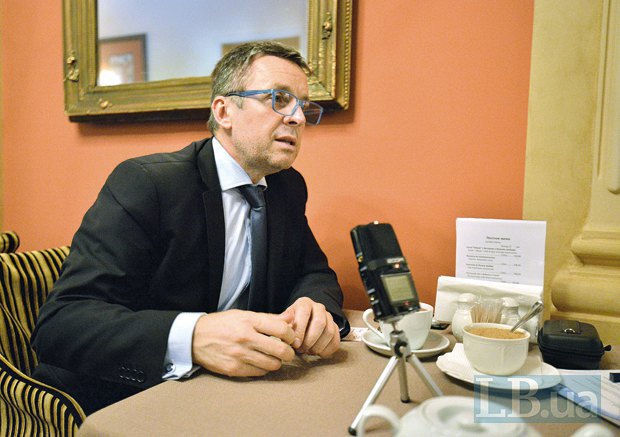
And the second problem was that this alternative proposed to sustain a very huge and very wrong deformation connected with the simplified [tax] system. Jaresko's alternative proposed to reduce the simplified system only for really small entrepreneurs, which is correct, good and transparent.
Today's simplified system is one of the biggest tools for tax evasion, for legal tax evasion. Even to have it for the legal persons, as it is still there and it was in the alternative proposal, is creating huge loopholes, huge possibilities for loopholes because what businessmen are doing, they are dividing their business into smaller businesses up to the turnover of 20m hryvnyas and they are not paying or paying almost nothing on physical persons' social security taxes.
I am not saying that there is nothing good in this alternative tax reform. And it has many things in public administration, fiscal administration and VAT administration, but these two things are simply unacceptable.
I really cannot understand it but there is still a myth in the Ukrainian society that it was a radical and liberal reform.
[Correspondent] Was it just good PR campaigning?
[Mikloš] Yes, it was.
[Correspondent] You were mediating the negotiations between the Finance Ministry and parliament, as far as I know.
[Mikloš] No, I was not. I was an adviser to the minister.
[Correspondent] I was told that you and [head of the parliament committee for tax and customs policy Nina] Yuzhanina had talked a lot, trying to persuade her?
[Mikloš] I met Mrs Yuzhanina three or four times, it was during bigger meetings, once with the president, Natalie Jaresko and some other people, once in the National Reform Council where there were even more people, which means we did not have any specific negotiations.
[Correspondent] So you did not manage to change her opinion?
[Mikloš] No-one managed to change her opinion.
[Correspondent] I wanted to show you something to illustrate what you have just been talking about. This is a restaurant recipe which says that is [run by] an individual entrepreneur. This is a fast-food network, which means that each of its outlets is [run by] an individual entrepreneur. And many construction supermarkets do the same.
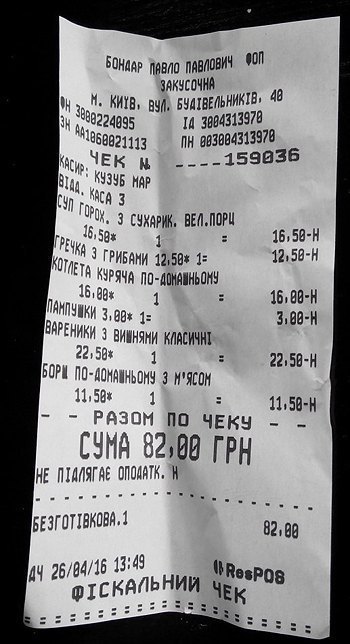
[Mikloš] Yes, and then it is destroying the business environment because if somebody is doing and somebody is not doing - if some guys were officially paying everything, they are not competitive. They are pushed to do it as well. But if everybody does it, the state will not have money. And then it is a vicious cycle.
[Correspondent] So the issue of the simplified system needs to be addressed. Should it be dropped or left in place but only for some small entrepreneurs?
[Mikloš] It should be addressed but not cancelled. For small entrepreneurs, for babushkas in markets, for really small entrepreneurs it is good not only because of lower tax burden but also because of simple tax administration. This is a good system but now it is too wide. Almost all professionals like IT experts, doctors, lawyers are on this system. They are not small entrepreneurs.
[Correspondent] What other changes are required? For example, preferences for the agrarian and IT sectors. Should they be kept or not?
[Mikloš] If Ukraine really wants to have liberal and radical tax reforms, there should be no exceptions or special rates. No preferences.
[Correspondent] In your opinion, why did not the lower unified social tax work out? Why did not it result in legalizing the salaries?
[Mikloš] Firstly, I think it is too early to say that it did not work out. We will see.
But if it is not, it is because the simplified system is still here. Before it was 41 per cent on the average, now it is 22 per cent. But under the simplified system, it is less. Why pay 20 per cent when you can pay 5 or 7 per cent?
Those people who were against cancelling changes to the simplified system - to have it really only for small entrepreneurs, they accused Jaresko's proposal that it would not lead to de-shadowing. Now there is no de-shadowing, or small de-shadowing it seems to be, but it is not Jaresko's system, it is Yuzhanina's system.
In my opinion, the simplified system is one of the most important reasons why there is no de-shadowing.
[Correspondent] Will you advise Groysman to change the simplified system and cancel these exceptions?
[Mikloš] I will advise it but, openly speaking, I do not see sufficient will to do this.
I hope the simplified system will be changed, at least partially. Maybe not to such extent as Jaresko proposed, which was a good proposal, maybe 50 per cent - even if we exclude legal persons, even if we only allow it for physical persons, it will be better than it is today. Every partial reduction is good. It is a step in the right direction.
My opinion is that the best solution would be to leave it only for really small entrepreneurs, up to some limit of the turnover, and not for highly paid IT and other professionals, not for legal persons, for sure.
[Correspondent] There are two big problems being discussed at talk shows: these are the sale of land and the sale of state-owned companies. Leftist politicians usually say that land and at least key state-owned enterprises of strategic significance should not be up for sale. What is your position on this? What can be sold and what should not?
[Mikloš] Ask those people who are against if they agree that corruption is a big problem for Ukraine. Ask these people if they think that the lack of investment is a big problem for Ukraine. Ask these people if they think that the restructuring of the industry, lagging behind and the outdated structure of Ukraine's industry are problems or not. They will tell you, yes, I agree with fighting against corruption, I agree that we need investments, foreign investors, I agree that we need to restructure and modernize our industry. But they do not, they are against it. Because if they are against the liberalization of the land market and privatization, they are against fighting against corruption, they are in favour of corruption, they are in favour of backwardness, they are not supporting tools for improving the situation in this area. This is the point.
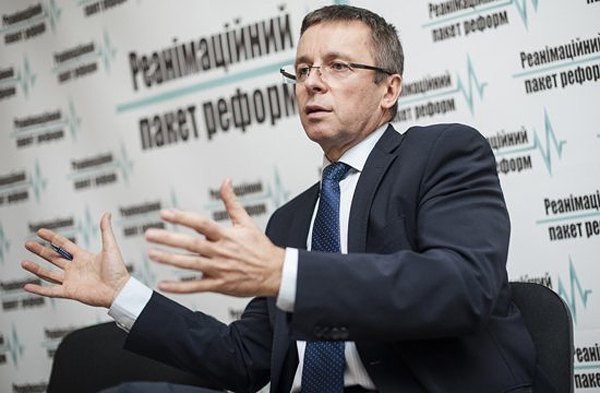
If you are speaking about, one of the biggest development potentials of Ukraine is in the land, in agricultural development. Land market liberalization can be an unbelievable tool for boosting and developing rural parts, which are the poorest and least developed parts of Ukraine.
Politically, this is also very important. I heard, maybe it is not exactly correct, 80 per cent of people are against selling the land, 20 per cent are in favour. But among those who own the land, it is on the contrary. Among the land owners, 80 per cent are in favour and 20 per cent are against. What are we talking about?
The prohibition on the sale of land is limiting and destroying land owners' property rights. We are not speaking only about the oligarchs or landlords. We are speaking about small owners who received their land after collective farms were received.
[Correspondent] City residents received flats and could sell them freely.
[Mikloš] To prevent them [rural residents] from selling their own property is nonsense. I think this is anticonstitutional if somebody is preventing me to deal with my property.
The second problem is that if you do not have the land market, you cannot attract investors. They will not come unless land is theirs or at least they have it in long-term rent. If the land market is open, those who have the land will be able to take loans because they will be able to sell it or use as collateral for a loan. But who would take something, which is impossible to sell, as collateral? It will give a lot of incentives for developing rural parts, for attracting investors and so on.
[Correspondent] But should there be any restrictions on foreign customers or on the size of a land plot?
[Mikloš] In my opinion, there is no reason for this but I understand that this is sensitive. But what can be done? You can do this: let us allow the sale of land to those who own it. Let us open the land market for privately-owned land. There is still a lot of land in state ownership. If it is sensitive, okay, let us allow the state lease it out through auctions for 50 years, for instance. It will stay state-owned and if you rent it for 50 years, you will attract real investors, who are going to invest in this land. They will invest if they are sure that can do business for 50 years.
Also, we could do what we did in Slovakia. Since it was sensitive to sell land to foreigners, we said we were opening the land market but if foreigners wanted to buy Slovak land, they would have to create a Slovak company and this company would be able to buy this land.
[Correspondent] And thus Slovakia can oversee this company.
[Mikloš] Yes. Of course, it is very sensitive. But why is it sensitive? Because nobody explains this to people. This is the biggest shortage of Ukrainian reforms that there is the insufficient leadership, ownership and communication of reforms.
Leadership means that reform leaders, politicians are convinced about the necessity of reforms and they are convincing other people as well. You can convince other people about anything only if you are convinced. Thus leadership also means a strong vision, will and courage of politicians to do reforms. It was insufficient. Now I have to say that I see Groysman as a rather strong leader in this regard. This energy price deregulation in one step instead of two steps was a very strong signal of the strong leadership.
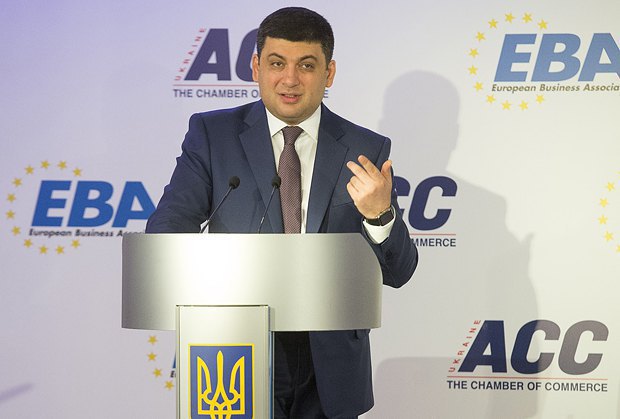
Ownership means that we are doing reforms not because of the IMF, the European Commission or financial market, but we, Ukrainians, need these reforms. Also Groysman's messages last week are very clear: yes, we have to accept and respect our obligations to the IMF programme but we need these reforms, not the IMF, we need these reforms more.
Communications means that politicians mean every possible opportunity to speak with people, to communicate with them and explain reforms, and to fight against populists. Unfortunately, it was insufficient in the last two years and it is also a reason why people are afraid of the privatization of land and privatization in general.
[Correspondent] If we touch upon the privatization of enterprises, should any of them remain state-owned? For example, pipelines, railways, postal services or banks? Should there be state-owned banks?
[Mikloš] Technically, companies which are natural monopolies should stay in state ownership. This concerns companies for which competition is impossible.
If we are speaking about Ukrzaliznytsya [Ukrainian Railway], it is possible to have it privatized but not in full. In the case of such very complex and complicated companies, they should be restructured before privatization and then it is necessary to privatize everything that can be privatized. It means that Ukrzaliznytsya needs to be unbundled or restructured into three companies. First of all, lines, then cargo, then personal transport. Only lines cannot be privatized because they have no alternative and you have to offer the same conditions to competitors, but there is no reason [not to sell] cargo and passenger transport. Okay, you can leave it in state ownership but you have to offer these lines to private operators. In the Czech Republic, one former state-owned company - cargo was not privatized - was sold.
[Correspondent] So the infrastructure should be kept first of all.
[Mikloš] Yes. The same is true for power networks. It was one company, everything was there. We divided it so that an electricity generating company and an energy distribution company were privatized. High-voltage transmission lines remain state-owned.
Banks. There is no reason to have state-owned banks. There is even no reason to have domestically-owned banks. In Slovakia and Estonia, there are no state-owned banks and the majority of banks are owned by Western (European or American) banks. Two small, middle-size banks are now owned by private Slovak companies. During the 2008-2009 financial crisis, Slovakia did not have any problem,
whereas in Slovenia, which has a similar name, a significant part of the banking sector is in state ownership. They have huge problems with corruption and inefficiency in these companies. During the crisis they had to recover these banks to save them.
— Mikloš
Speaking about the so-called strategic companies, these are the companies for which it is impossible to have competition. Because, and it is true, private monopolies are worse than state monopolies. Technological progress is changing this because 20 years ago telecommunication and postal companies were also natural monopolies. Now they are not because new technologies allowed for new competitors, for instance, mobile phone operators.
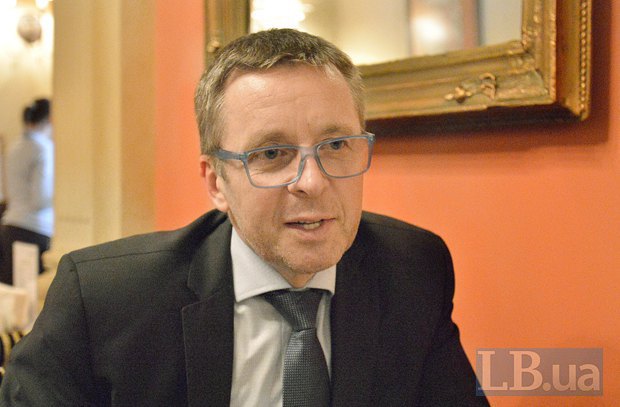
Privatization has to be as fast, broad and transparent as possible. Especially when we speak about big companies.
Some big companies need restructuring prior to privatization, some of them not. To do it transparently and by standards applicable to big companies, you will have to hire advisers: big investment banks, foreign investment banks or consulting companies that are doing this. They have to prepare a standard process. This process is very complicated, it takes 1.5-2 years. And then [they will be able] to have real competition and attract really strong strategic investors from abroad.
In this kind of big companies you can avoid domestic oligarchs. You can say you will sell it only to big foreign strategic investors. However it is very important to create conditions for real competition and to protect state interests. For that you have to hire advisers who will protect your interests against the interests of potential buyers because they will want to buy as cheap as possible. You will hire advisers whose interest will be to sell it as expensive as possible because they will be paid a fee from the successful deal. It is very important that counterparts of these big guys from strategic Western companies will be not your people at the ministry who are poorly paid and not qualified to do this, your representatives will fight on your side for your public interest.
That is why the privatization of big complicated companies without advisers is a very wrong and dangerous approach, but it takes time. That is the reason why it is necessary to start as soon as possible.
[Correspondent] Do you think any assets will be sold this year?
[Mikloš] If you mean big companies, the answer is no.
[Correspondent] What about Odesa Portal Plant?
[Mikloš] I do not know. It is in the process [of privatization]. Odesa Portal Plant is only one company while there are hundreds or at least dozens of these companies.
The problem is that unless you start the process now by hiring advisers, you will have no progress in the next two years because, as I said, the process will take 1.5-2 years.
The first thing is to hire advisers. If you want to hire advisers transparently, you have to open an international tender even for hiring advisers. It will take four or five months. Then advisers should have time to prepare everything, documentation, due diligence.
The previous government did a lot during the last two years, much more than 20 plus years before. But if we speak about privatization, for instance, nothing was done. We lost two years. And if there is no change now, we will lose another year.
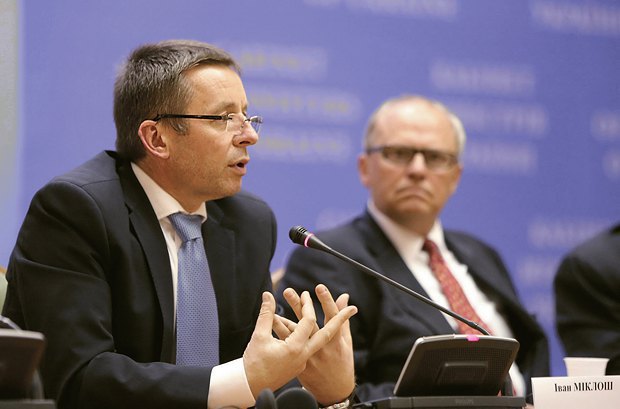
[Correspondent] Mikheil Saakashvili recently said that it would be good not to borrow from the IMF at all. Can Ukraine do without IMF money at all?
[Mikloš] Yes, when Ukraine does five times more reforms, if Ukraine convinces international markets, international creditors that, even without the programme, Ukraine is credible and is able to receive money on the market, why not?
This [such statements] is another kind of populism. If someone seriously says that it is possible to work without the IMF, it is simple populism which creates unrealistic expectations.
What happened in February 2014 [possibly Mikloš means February 2015 - ed. note)? Devaluation, monetary crisis, run on the banks, more than 40 hryvnyas per dollar. At that time, Ukraine's international reserves were 4.5bn dollars, which is not sufficient. Now the situation is better. Currently, there is 13.5bn dollars. Do you think that this is Ukrainian money? It is the IMF money.
The last tranche of the IMF came in August 2015, not a dollar for eight-nine months since that time. Now if this first package is approved, Ukraine will receive around 4bn dollars. [It will include] 1.7bn from the IMF, 1bn from US government guarantees, 600m from Europe. Around 4bn dollars will come and the reserves will increase to around 18bn dollars. If there is 18bn dollars, foreign currency deregulation can be started. For instances, dividends repatriation can be allowed. Without this foreign currency deregulation, there will be no investment in fact because who will come if they cannot take dividends home. These 18bn dollars is not Ukraine's money, but foreign loans from the IMF, not from the market.
[Correspondent] Why has the third tranche been lagging for so long?
[Mikloš] Because Ukraine has not yet fulfilled all the terms.
[Correspondent] The list of laws yet to be adopted was made public at the latest meeting of the National Reform Council. So is it only up to parliament now or there is a problem with the government too?
[Mikloš] When we speak about the last tranche, legislation has been in parliament for many weeks. Now we will see if gets passed or not. The biggest problem was in parliament all the time. In 2015, only 37 per cent of government proposals were approved by parliament. Of course, I am not saying that parliament is the only to blame. Finally, parliament did not pass these. But they say the legislation was wrong, we received it too late, there was no time to discuss it, and communication was very poor. Maybe, that is true. But the result is important.
[Correspondent] How to overcome social problems such as poverty, the ineffective pension, healthcare and education systems?
[Mikloš] Poverty. Yes, the last two years were difficult. There was economic recession of 6.8-7 per cent in the first year and 10-11 per cent in the second year. [According to the State Statistics Service, there was a decrease of 6.6 per cent in 2014 and 9.9 per cent in 2015 - ed. note.]
[Correspondent] In the dollar equivalent, income has shrunk more than in half, according to my estimates.
[Mikloš] You cannot make accurate estimates in dollars as people spend their money in hryvnyas. No doubt, it is a very difficult situation. But, first of all, this is not because of reforms, this is because of the lack of reforms in the past. The problem is that people do not see it like this. For many people this is because of reforms. This is a lack of communication. Because if only populists are communicating and fighting against energy price deregulation and so on, then people do not understand of course.
Not only the lack of reforms before, but also, of course, due to the Russian aggression and trade war with Russia, which means an external attack.
The only possible method how to overcome this is through reforms. Reforms are not the reason of hardship and severe times, reforms are only the method how to overcome this and reduce hardship and poverty.
The only possible solution is to have an economy that is growing, attracting investors and recovering itself. The only way how to do this is reforms.
A lot has been done with regard to macroeconomic stabilization, but people do not understand this due to poor communication.
In 2014, your public finance deficit was more than 10 per cent, last year it was 2 per cent. Natalie Jaresko really did a miracle. I do not know any other country which has reduced the fiscal deficit from more than 10 per cent to around 2 per cent. It is a true achievement.
People do not understand, of course, a connection between the fiscal deficit decrease and their life. It is very direct. Fiscal consolidation is one of the necessary preconditions for sound economic conditions which are necessary for economic growth, investment influx, which is necessary for higher salaries and pensions and better public services. There is no other way how to do it.
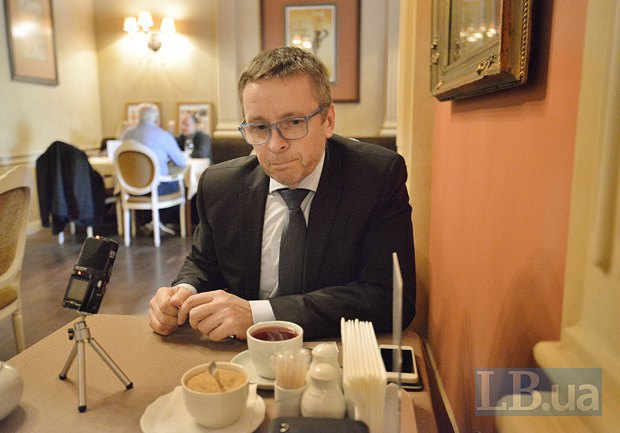
This means populists are fighting against reforms. They are fighting against unpopular but necessary measures. This looks very nice because they are against bitter medicines. But they are not offering an alternative. On the contrary, they are only offering the return to the old times which are only creating bigger and bigger hardships and poverty.
Of course, if the state is preparing energy price deregulation, it is its obligation to do not only this deregulation but also to help those who are most vulnerable, poorest people. This is what the state is doing. A very good example is yesterday's decision to increase the tariffs to the market level, which was a great and very important step, and at the same time the government said that it is was increasing social subsidies by 10 per cent instead of the earlier planned 6 per cent, that it was increasing the minimum wage and cancelling pension taxation. This is exactly what should be done.
Subsidizing or doing social policy by energy price deregulation is not only unsustainable and costly, it is also unjust because then you are subsidizing all, rich and poor. You are also subsidizing rich people much, much more than you are subsidizing poor people. Because when you sell cheaper gas to households, oligarchs or big businessmen in their 500 sq.m. villas with swimming pools use much more subsidized gas than poor people in small flats, which means it is nonsense. If everybody has to pay a market price and you only give subsidies to only those who need it, it will be much more effective, cheaper and just.
Pension reform. Two or three years ago, in 2013, Ukraine's public expenditures on pensions made 16 per cent of GDP, twice as much as in other comparable countries. In other countries, it is 8-10 per cent. The first steps were made when privileges for different groups of privileged people were cancelled. The second step has to be done, which is a reform of the first pillar [of the pension system] in connection with inflation, valorisation and pension age.
It will be necessary to change the pension age. It is also unpopular, but without this the system would be unsustainable.
[Correspondent] The government is not ready for this step yet.
[Mikloš] It is one of the preconditions of the IMF.
[Correspondent] In Slovakia, is it 62?
[Mikloš] What we did in Slovakia - and I recommend that we do it also here - to not make this decision every year because it is a very sensitive decision. We decided, when I was finance minister, to approve a formula, according to which the pension age increases by half a year every year.
[Correspondent] Ukraine did the same in 2011 when the retirement age for women was increased from 55 to 60.
[Mikloš] It did, but it should be increased further.
[Correspondent] Up to 62?
[Mikloš] We raised it to 65 in Slovakia.
Regarding healthcare and education. These are public services. High inefficiency, corruption and waste of money in these sectors. If we have a growing economy after reforms are done, we will have much higher economic growth and much more money on healthcare and education. But even now, where there is not enough money, it is being wasted and not used effectively. Not everything, but still.
For example, statistics show that you have a huge overcapacity in healthcare. Beds per hospital per 1,000 residents are sometimes many times more than in rich developed countries. Reducing this overcapacity will bring you additional money. If this saved money is used on medicine and medical treatment, it will improve people's health.
In education, it is the same: wasting, corruption but also an ineffective use of money for many small schools. You have schools with 15-20 children. Costs per child in such small schools are times higher than costs per child in big schools. If you close these small schools and use part of the saved money to buy buses, you will be able to provide bus transport for those children from the small villages free of charge. You will save money, you can use this money in the education system and you will offer these children better education. Bigger schools have more high-qualified teachers whereas in small schools one or two teachers have to teach everything.
[Correspondent] I know that Moldova had a similar reform. My friends told me that at first, the reform seemed effective, but then buses got broken, new schools did not open and the situation turned for worse.
[Mikloš] This is not an argument against this change. The problem is that reforms are a never-ending process. You have to improve and develop the system every day forever. Even the most competitive and effective countries every day try to improve the system, to invent something, to implement something new.
This is not even a reform, it is a rational step how to reduce inefficiency and wasting of money. Of course, a real reform is much, much reform, it is connected with real decentralization, fiscal decentralization, responsibility of elementary schools in local self-governments, the methods how you divide money and responsibilities among them and so on. We have four or five different education systems working in different countries and it is necessary to pick the best for Ukrainian conditions. It is a much more complex and complicated process. I am just thinking about the most visible and evident mistakes and deformations which are there and can be corrected in a few weeks or months.
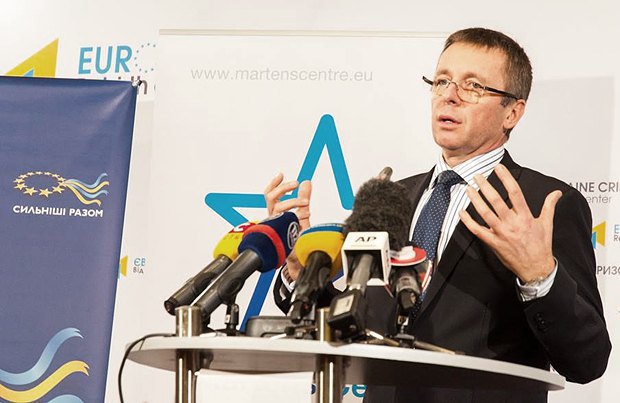
[Correspondent] After the budget decentralization, local communities now have much more money than before. Perhaps, educational and healthcare institutions should be transferred to the level of local communities? They know better how many schools and hospitals they need. Or this would require giving them even more money from the centre?
[Mikloš] I am not an expert in the Ukrainian system which means I do not know if they need more money. In principle, it is important. You will have to give them more competences, more power to manage these issues. Together with competences you will have to give them money, of course. You will also have to give them responsibility, not only money and competences. If you give them more money, you will have to impose rules which will impose hard budgetary constraints. This means you will create strict rules to keep them from destroying public finance. Local and regional self-government budgets are part of the public budget. In normal conditions and everywhere, the state budget is only one part, the biggest but only one part of the public finance, and overall public finance health and soundness are important, which means the state has to have tools and power not by direct interference but by creating rules.
For instance, we have strict limits on indebtedness for local and regional self-governments. They cannot take more loans than a certain share of their annual revenues.
Another important point is that you will need real decentralization. And you do not have internal real decentralization. You have real decentralization in local self-governments because local mayors are elected directly by local voters. But in regional and sub-regional self-governments, bosses are not elected by people, they are appointed. This is partial decentralization. Those people have to be elected by those people who live there.
In principle, we have different types of public services. Some public services are nationwide. For example, national security or foreign policy. It has to be a competence of the central government. Some are divided. For instance, highways are important for the whole country and have to be managed by the central government or central government agencies, but regional roads, their repairs have to be in the hands of regional authorities.
[Correspondent] I think it works this way with the roads here.
[Mikloš] But in every area you have to be guided by the same logic.
The problem is that money is collected more centrally. Which means you have to have some formula by which you allocate part of money to the self-government. In Slovakia, all revenues from physical persons' tax are distributed to the regional and local self-governments by the formula which is in law and which is impossible to change without changing the legislation, which means they have long-term conditions by which they know how much money they will receive.
[Correspondent] You said that economic growth was essential. Ukrainian economist Pavlo Illyashenko recently said that Ukraine would not be able to catch up with Poland even in 20 years. Not to mention richer countries. Do you think Ukraine can grow faster than it is forecasted now (1.5-2 per cent in 2016)? Can Ukraine achieve the sustainable growth of 7-10 per cent?
[Mikloš] I am deeply confident that if Ukraine does real reforms, it can achieve the long-term growth of 5-6 per cent, and in the short prospect, it can grow by 7-9 per cent.
If Ukraine is to catch up with Poland, it will of course depend on Polish development. If Poland grows, you have lost 25 years, and this loss is huge. Now Poland has four times more per capita than Ukraine, I heard. But for Ukraine it is much more important to catch up with and be more developed than Russia. This is realistic.
— Mikloš
If Ukraine becomes a more developed and rich country in comparison with Russia, you have a chance that in a foreseeable future, you will control Donetsk and Luhansk again. And maybe you will gain Crimea back as well, but only if people in Crimea see that people in Ukraine live much better than in Russia or in Crimea. Economic reforms are a topic of national security. That is the reason why populists are not only dangerous to reforms and reformers, they are dangerous because they are against Ukraine and successful Ukrainian future.








